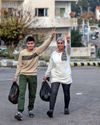
Three fishers sit around a bare table in Pätea Boating Club, a few hundred metres back from New Zealand's South Taranaki coastline. Pigeons have left droppings on the floorboards, and through the salt-dusted windows the ocean pounds against the black sand.
"This is one of the best fishing areas in the country," the club's commodore, Steve Corrigan, said of the South Taranaki bight, which sweeps along the vast west coast of the North Island.
"And it's at risk of being ruined." Aside from its abundant fish species, the bight is home to rocky reefs, New Zealand pygmy blue whales and is visited by endangered species such as the Maui dolphin, the world's rarest. But over the past 11 years the region's seafloor has generated global interest and become a bitter battleground between a mining company and locals who live and work along the coast.
Since 2013, Trans-Tasman Resources (TTR) has been trying to gain consent to mine the iron sands between 19 and 42 metres below the surface. Iron sands are rich in rare earth minerals used in the production of steel, batteries and spacecraft - and increasingly soughtafter for renewable energy.
TTR's proposal to mine up to 50m tonnes a year for 35 years has created a years-long legal dispute with the community, which fears the sediment discharged back into the sea will smother marine life, impact fishing and endanger rare marine mammals.
The fight against seabed mining in the politically conservative Taranaki region is galvanising unlikely bedfellows dairy farmers, boaties, surfers, schools, iwi (Māori tribes) and environmental groups are working together to block the proposal.
"I don't think any of us would call us greenies," said Phil Morgan, a former dairy farmer and avid fisher. "We're pro-business... but this [area] is far too important to wreck."
Bu hikaye The Guardian Weekly dergisinin August 30, 2024 sayısından alınmıştır.
Start your 7-day Magzter GOLD free trial to access thousands of curated premium stories, and 9,000+ magazines and newspapers.
Already a subscriber ? Giriş Yap
Bu hikaye The Guardian Weekly dergisinin August 30, 2024 sayısından alınmıştır.
Start your 7-day Magzter GOLD free trial to access thousands of curated premium stories, and 9,000+ magazines and newspapers.
Already a subscriber? Giriş Yap

AI has made the move into video and it's worryingly plausible
I recently had the opportunity to see a demo of Sora, OpenAI's video generation tool, which was released in the US last Monday, and it was so impressive it made me worried for the future.

With tyrant Assad ousted, Syrians deserve support and hope
Last week, time collapsed. Bashar al-Assad's fall recalled scenes across the region from the start of the Arab spring almost 14 years ago. Suddenly history felt vivid, its memories sharpened. In fact it no longer felt like history.

TV
The Guardian Weekly team reveals our small-screen picks of the year, from the underground vaults of post-apocalyptic Fallout to the mile-high escapism of Rivals

Albums
Murky love stories, nostalgic pop and an in-your-face masterpiece captured our critics' ears in 2024

Trailblazers The inspiring people we met around the world this year
From an exuberant mountaineer to a woman defiantly facing the guns of war, here are some of the brave individuals who gave us hope in a tumultuous 2024

Out of touch How president sealed his own fate in martial law gambit
For Yoon Suk Yeol, this month's short-lived martial law declaration wasn't just a catastrophic miscalculation - it was the culmination of a presidency that had been troubled from the start.

Son of the soil Who is François Bayrou, the farmer turned prime minister?
François Bayrou, the new French prime minister, calls himself a country man. A tractor-driving \"son of the soil\" and breeder of thoroughbreds, he has run for president three times, saying his rural roots and centrist politics led him to try to find common ground between left and right.

Power plant workers keeping the lights on
The Guardian Weekly visits a Soviet-era coal-fired thermal installation to learn how it has held up to Russian attacks

'We fear new oppression' Alawites worry over rebel rule
To prepare khubeiza, the leaves of the kale-like plant must be roughly chopped and sauteed with onions, garlic and a dash of salt. According to folklore, the recipe originated among the Alawite communities who lived in Syria's mountainous coastline where the fibrous, wild-growing plant can be found in abundance. So poor were the Alawites in Ottoman times, the story goes, that the only food they could find to eat was khubeiza, which sprouts like a stubborn weed every spring.

'Gisèle is waiting for explanations'
The Pelicot rape trial has horrified the world. But as it comes to an end, the questions it has raised about French society and rape culture have still not been answered.